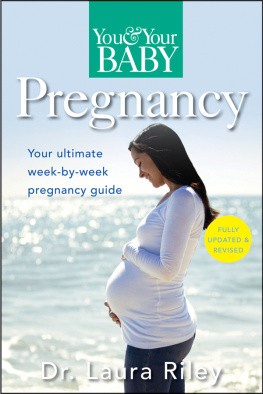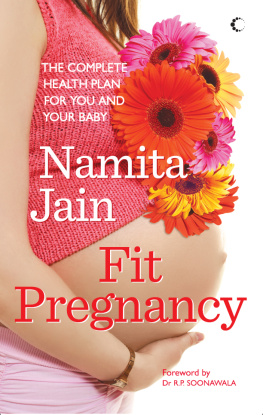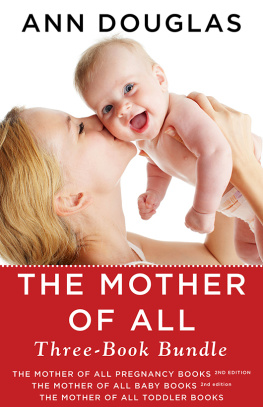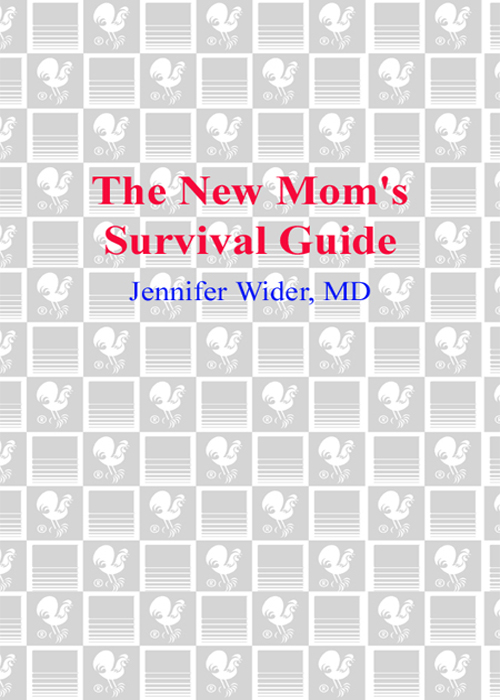
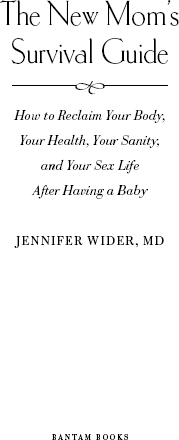
CONTENTS
For my dad
Who has brought more than 5,000 lives into the world.
Your professionalism, integrity, and compassion
embody the very essence of being a doctor.
and
For my mom
My personal survival guide.
Your selflessness, encouragement, and unconditional love
embody the very essence of being a mother.
ACKNOWLEDGMENTS
Writing a book while raising young children can be a bit of a challenge, so I have more than a few people to thank. First off, thank you to my husband and my rock, Erez, who has continuously supported me through several manuscripts, late-night and early-morning radio shows, and reading my articles in Cosmo magazine (publicly). Your patience, kindness, and encouragement mean so much.
A special thank-you goes to my daughter, Orly, who is by far my biggest fan and who recently told me that shed buy all my books in the bookstore if they languished on the shelf for more than two days. Your creativity, artistic abilities, and love of learning continue to inspire me.
And another special thank-you to my son, Ryan, whose afternoon nap allowed me to finish this book. Your curiosity and cleverness are a joy to watch develop. Thanks, too, to The Very Hungry Caterpillar, Curious George, and Really Rosie videos that gave me a few extra minutes when Ryan woke up.
Being a mommy to both of you makes me a better person.
Thank you to all of the new moms who shared their experiences with me. A sincere thank-you goes to Lisa, Emily, Macon, Jamey, Annie, and our fearless leader, Karen B.the original Brooklyn mommy group. And thank you to Laurice, who was always there to go through so many first year challenges with me.
Thank you to Susan Arellano who recognized the need for this book. And, finally, Id like to thank Beth Rashbaum, whose tireless efforts and extraordinary editing abilities helped to make this book a reality.
INTRODUCTION
When I was pregnant with my first child, I had absolutely no idea what to expect. I went about my business as if nothing was different. At work Id occasionally glance down at my growing belly as thoughts of chubby, quiet, smiling babies dressed all in white filled my mind. I had convinced myself that my life wouldnt really change.
Fast-forward to after deliveryI was sitting in my infant daughters room and we were both crying. She was crying because she needed a new diaper; I was crying because I missed my old life, felt wiped out from lack of sleep, and was simmering with resentment toward my husband, whose life hadnt really changed at all. To add insult to injury, he came home that night in the mood. Was he on drugs?
Two months later, just as my daughter turned three months, I started a support group for new mothers. We were thrilled to be new mothers (most of the time), but we were also filled with raw, mixed, and overpowering emotions. And although each discussion always began with our children, the conversation eventually veered back to us.
We spoke about our sex lives, or lack thereof; our emotional state; the changes in our bodies, which we feared were permanent; our issues about staying at home versus going back to work, and oh so much more. Each week there was a new topic, and when the women found out that I was a doctor, the conversations shifted to our physical health: Is it normal that my hair is falling out? Why cant I lose the weight? Why are my feet larger; will they ever shrink to their normal size? If my child has the croup, can I get it? When will it stop hurting to have sex? Ever since I had my son, when I laugh, urine comes outis that normal? We had all spent the nine months of pregnancy strictly monitored by a staff of medical professionals; but once the baby came, we were dropped like hotcakes. Even our families stopped asking how we were feeling! It became apparent to me that women have health issues that extend well beyond the birth of a baby, and questions that need answers. Just because wed each had a baby, it didnt mean that our minds and bodies had ceased to exist.
There was no single resource available to us that could credibly answer our questions. And the resources that do deal with this period tend to focus on the health of the baby, not the babys mother. If Mom is mentioned anywhere outside the epilogue, it is usually only in the context of postpartum depression. But new moms have many other health concerns that are particularly likely to arise at this time.
I remember at one of our support group sessions, a woman had spotted a skin change under her arm, and after going online, she came in crying hysterically, convinced she was dying from skin cancer. She didnt realize that certain skin changes were normal during and after pregnancy. What she had spotted turned out to be a normal skin tag.
As a doctor and a mother, I knew I had to do something. So I set out to write a book that could offer new mothers sound and reassuring medical advice about their physical and mental health. I interviewed a multitude of new moms to find out what issues were relevant to their lives. What I found was that given the time and opportunity, new moms have a lot to say.
Women are the caretakers for their families. They are responsible for the health and well-being of their partners, their children, and often their aging parents as well. But sometimes their own health issues can get lost in the shuffle. My hope is that I have created a solid, well-researched health guide for new moms that addresses their concerns about themselvesthose concerns that tend to get buried in the avalanche of information about the health of their children.

Your Healthy Self
THE BASICS
Y ouve got to love your husband. He has sex, he has an orgasm, ejaculates, and nine months later calls himself Dad. You have sex, probably without an orgasm; for the next thirty minutes you lie propped up on a pillow with your legs in the air, hoping his sperm will make its way up the cervical canal and meet up with your egg; and then you wait anxiously until you can take a pregnancy test to find out whether in nine months youll be able to call yourself Mom. Of course, all of this assumes you had planned to get pregnant, which doesnt take into account the percentage of pregnancies, however welcome they may be, that are unplanned.
But thats just the tip of the iceberg, right? You spend the next few months nauseated, vomiting, and eating saltines. All the while, he takes clients to four-star restaurants and eats four-course meals. While your body contorts into different shapes, his body stays exactly the same. Maybe he gains a few extra pity poundsbut for the most part, youre on your own.
Over the months that follow, you complaina lot. He comforts you while flicking the TiVo controller. You burp, fart, and have heartburn that could light your house on fire. He smiles, rubs your feet, tells you what a great job youre doing.
When you get to bed, you cant sleep; he sleeps like a baby. Your mind is racing: Will I be a good parent? What will our lives be like? How will I cope? Maybe you even wake him out of his sound sleep with your questions. Piece of cake, he tells you, and falls fast asleep again. You gaze down at your enormous belly, your aching breasts, the spider veins that are slowly creeping their way up your legs. You look at his body as he snores and realize that nothings changed for him; is this fair? Do I even need to answer that question?
Next page

